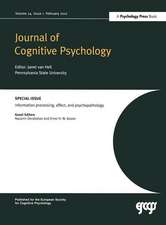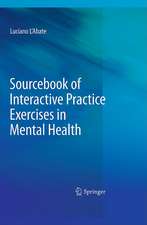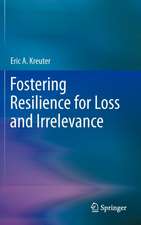Behavioral Neurology in the Elderly
Editat de Jose Leon-Carrion, Margaret Gianninien Limba Engleză Hardback – 27 iun 2001
Beginning with a historical view of aging and healthy living, this practical and informative book describes the most important neurobehavioral issues such as information processing, motor function, language and communication. It also provides essential information on neurobehavioral disorders such as depression, sleep disorders, epilepsy, apraxia, dementia and stroke. Furthermore, it offers an ultimate guide to medical and neuropsychological geriatric assessment and evaluation. A resource for all professionals working with elderly people, Behavioral Neurology in the Elderly points out new directions in research methods for assessment, diagnosis, and treatment.
| Toate formatele și edițiile | Preț | Express |
|---|---|---|
| Paperback (1) | 504.72 lei 43-57 zile | |
| CRC Press – 18 dec 2020 | 504.72 lei 43-57 zile | |
| Hardback (1) | 1426.04 lei 43-57 zile | |
| CRC Press – 27 iun 2001 | 1426.04 lei 43-57 zile |
Preț: 1426.04 lei
Preț vechi: 1501.09 lei
-5% Nou
Puncte Express: 2139
Preț estimativ în valută:
272.88€ • 285.62$ • 227.12£
272.88€ • 285.62$ • 227.12£
Carte tipărită la comandă
Livrare economică 31 martie-14 aprilie
Preluare comenzi: 021 569.72.76
Specificații
ISBN-13: 9780849320668
ISBN-10: 0849320666
Pagini: 482
Ilustrații: 100 black & white illustrations, 46 black & white tables
Dimensiuni: 156 x 234 x 38 mm
Greutate: 0.82 kg
Ediția:1
Editura: CRC Press
Colecția CRC Press
ISBN-10: 0849320666
Pagini: 482
Ilustrații: 100 black & white illustrations, 46 black & white tables
Dimensiuni: 156 x 234 x 38 mm
Greutate: 0.82 kg
Ediția:1
Editura: CRC Press
Colecția CRC Press
Public țintă
Professional Practice & DevelopmentCuprins
INTRODUCTION. FUNDAMENTALS The Psychology of Aging: An Historical Perspective. Gerontology as a Specialty Medicine. Neurobehavioral Epidemiology of Aging. Neuroanatomy of Functional Aging. COGNITION AND BEHAVIOR IN THE ELDERLY. Information Processing in the Elderly. Memory and Executive Dysfunction in the Elderly: The Role of the Frontal Lobes. Motor Functions and Praxis in the Elderly. Normal and Pathological Language in the Elderly. Emotional Disorders in the Neurologically Deteriorating Older Adult. Aging, Sleep, and Neuropsychological Functioning Outcomes. NEUROBEHAVIORAL ASSESSMENT. Neuropsychological Assessment in the Elderly. Minimal Cognitive Impairment. Evaluation of Intervention Programs for the Elderly: Enhancing Validity. ADVANCES IN TREATMENT. Neuropharmacology for Older Adults. Dementia in Primary Care. Neurobehavioral Syndromes in Patients with Cerebrovascular Pathology. Treating Depression in the Elderly. Advances in the Prevention and
Treatment of Age-Related Organic Memory Disorders. Anticonvulsant Drugs and Cognitive Functions in Elderly Patients with Epilepsy. Advances in the Treatment of Inflammatory Diseases: Multiple Sclerosis. Vitamin, Mineral, Antioxidant, and Herbal Supplements: Facts and Fictions.
Treatment of Age-Related Organic Memory Disorders. Anticonvulsant Drugs and Cognitive Functions in Elderly Patients with Epilepsy. Advances in the Treatment of Inflammatory Diseases: Multiple Sclerosis. Vitamin, Mineral, Antioxidant, and Herbal Supplements: Facts and Fictions.
Notă biografică
José León-Carrión, Ph.D., is Professor of Neuropsychology and Director of the Human Neuropsychology Laboratory at the University of Seville, Spain. He is involved with several rehabilitation programs, including the Center for Brain Injury Rehabilitation (C.RE.CER) in Seville, an interdisciplinary center for neurorehabilitation. He is also Vice President of the International Brain Injury Association (IBIA) and President of the Academy for the Advancement of Brain Injury Rehabilitation. Professor León-Carrión is a member of the Euroacademy for Multidisciplinary Neurotraumatology and the European Brain Injury Society. He has served as President and Chair of the Second World Congress on Brain Injury and has participated in conferences worldwide. He is also the Executive Director of the Revista Española de Neuropsicología. Professor León-Carrión is a member of several journal editorial boards. He is recognized for international books and articles related to assessment and rehabilitation of brain injury and for textbooks in neuropsychology. Margaret J. Giannini, M.D., F.A.A.P., is the immediate past Deputy Assistant Chief Medical Director for Rehabilitation and Prosthetics, Department of Veterans Affairs, Washington, D.C. In 1979, President Jimmy Carter appointed Dr. Giannini as the first Director of the National Institute of Handicapped Research, now known as the National Institute of Disability and Rehabilitation Research. Dr. Giannini was a founder and director of the Mental Retardation Institute of New York Medical College, the first and largest facility for the mentally retarded and the developmentally disabled of all ages and etiologies in the United States and the world. She established one of the first university-affiliated facilities at New York Medical College. Dr. Giannini is a Diplomate of the American Board of Pediatrics, a Fellow of the American Academy of Pediatrics, and a member of the Institute of Medicine of the National Academy of Sciences. She is the recipient of many national and international awards in recognition of her professional and humanitarian services and achievements. She has chaired more than 35 international conferences on rehabilitation and developmental disabilities in many countries, including Israel, Spain, China, Russia, Argentina, India, and Egypt. She has published extensively and she lectures nationally and internationally. She is Chairman of the Board of Trustees, The American University of Rome, Italy.
Descriere
Beginning with a historical view of aging and healthy living, this book describes important neurobehavioral issues such as information processing, motor function, language, and communication. It also provides essential information on neurobehavioral disorders such as depression, sleep disorders, epilepsy, apraxia, dementia, and stroke. Furthermore,



















